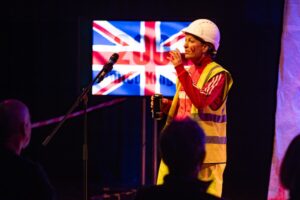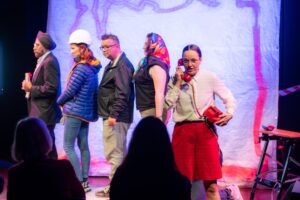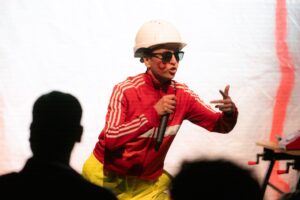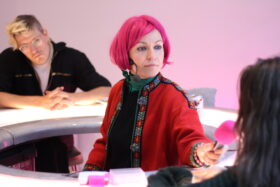< BACK TO NEWS
“I initially thought it was just another migrant story” – theatre writer/performer Margot Przymierska on her latest play, Monument
Margot Przymierska is a Polish-born performer, writer and creative producer now living in the UK. She brings Monument, a powerful theatrical piece that explores the cyclical nature of power, ideology, and human displacement, to West Yorkshire.
Can you tell us about Monument?
The show consists of two separate stories. The first is set in 1948 in communist-era Czechoslovakia and is inspired by a true story. It involves a Soviet apparatchik (a member of a Communist Party) who organises a competition to design the largest Stalin monument in the world, and follows the story of the monument’s construction, brief existence and eventual destruction.
The second revolves around Bogdan, a Polish construction worker who migrates to the UK in the 2000s, chronicling his journey from labourer to successful businessman, set against a backdrop of an increasingly fractious Europe.
I initially thought it was just another migrant story but then I realised from talking to people that a lot of Polish migrants are doing really well in Britain now, they are no longer the underdogs. If anything they’re part of the new middle class.
What made you want to tell these stories?
I come from Poland and being eastern European I try to reflect this culture through my work and what it’s like being a migrant.
There’s been a lot of talk in the UK about decolonisation and this got me thinking about Poland and other eastern European countries being colonised by the Soviets. A lot of my values were forged from the background of that experience which my parents lived through and that gets passed on from one generation to another.
“Polish migrants are doing really well in Britain now. They are no longer the underdogs. If anything, they’re part of the new middle class.”
You moved to the UK in 2003. Why did you decide to come here?
I was born in Białystok, a city in eastern Poland, and I came to the UK for a sense of adventure. I was 18 at the time and didn’t know what I wanted to do with my life, so it was just an intuitive leap. I had a friend living here and initially I was only planning to stay for 10 days but ended up getting a job and I’ve been living and working here ever since.

Margot in Monument credit Luminous Photography
How did you end up becoming an actor, writer and performer?
I didn’t manage to get into drama school in Poland, but after a few years living in the UK I was accepted by East 15 Acting School in Essex. I thought I would be an actor but I quickly realised I didn’t just want to re-enact other people’s visions.
I started making my own work and in 2011 I set up the Polish Artists in London network, to bring creatives together. As well as producing work for the stage I’ve done all sorts of jobs in order to stay afloat, everything from looking after horses (which I really didn’t like) to doing interpreting work.
I’m now a co-director and lead creative producer of The People Speak, an art collective that runs workshops and helps connect diverse groups through culture and the arts.
Where did your interest in theatre and performing come from?
When I was a child I remember there was this war series about a bunch of guys who drove a tank and they had a dog. It was a bit of a Soviet propaganda show but I really loved it and I used to reenact scenes for my parents. From that point they thought ‘oh, you’re going to be an actor’ and I think that must have stayed in my head.

Margot in Monument credit Luminous Photography.
You grew up in Poland at the tail end of the Cold War. How did growing up in a communist country shape your outlook on the world?
In Poland there was quite an abrupt transformation. Suddenly there was the end of communism and you had the free market. People didn’t really know quite how to deal with this change. I remember watching TV adverts thinking they were amazing. It was often for silly things like Mentos mints but I used to tape them on the VHS and watch them back because they were so different.
Communism brought bad things, but people also had a sense of security and their lives were organised. After it collapsed people started becoming more interested in material things and the shared experience that families had before started to be eroded.
“I like stories that are a bit unusual or champion the underdog.”
What are some of the key recurring themes in your work?
I think freedom of expression and identity, but also the cycle of history and what kind of world we’re inheriting. Margaret Thatcher said ‘there’s no such thing as society’ but what is the alternative? We just become a bunch of individuals. It’s difficult to have a shared collective identity as a nation but I think it’s important to try and move forward as a society. I like talking to people from all walks of life and I like stories that are a bit unusual or champion the underdog.

Margot in Monument credit Luminous Photography
How have attitudes towards migrants changed in the UK?
When I first moved here there was maybe a bit of apprehension and looking down on Polish people. Then it was ‘great, cheap labour’. I remember working in a pub and when they found out where I came from, they would say ‘our cleaner is Polish.’ I think migrants who came here 20 years ago just got on with their lives and many of them have gone on to be successful and become important people in their communities and are contributing to the economy. We got into people’s good books and now you can see the attitude is turning again, which does worry me a bit.
Can theatre and art make a difference?
As an artist I feel it’s my responsibility to make work that provokes some kind of reflection, helps tease out questions and piques curiosity, because you don’t know who needs to see that show, or see that performance. They might see it and go ‘yes, this is how I feel’ and it gives them a space to talk about how they feel or share the moment with others, and that’s why it’s so important.
It’s ok to make theatre that doesn’t necessarily fit in or doesn’t fall into a particular category. This is what I love about Red Ladder. They go out to places where people are but where theatre perhaps isn’t and they create opportunities for people to interact with something different. And I think that’s something we all need.
Main picture: Margot Przymierska performing in 2025. (Credit The People Speak)



